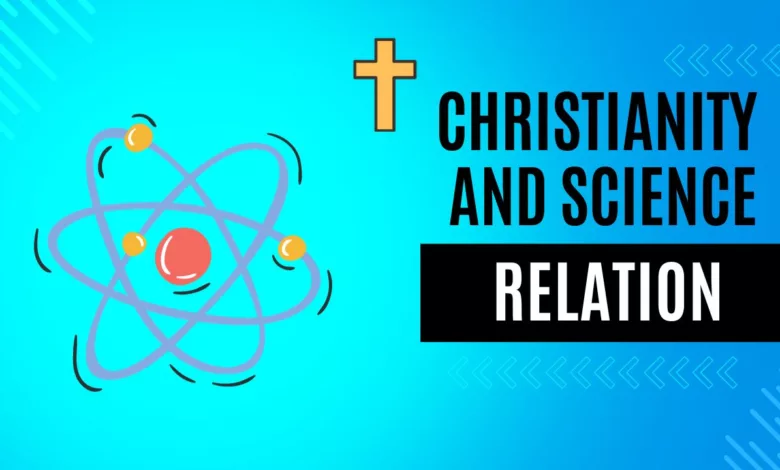Christianity And Science | Harmony and Conflict | Relation | 2023

Is there a conflict between Christianity and science?
There isn’t an inherent conflict between Christianity and science. While there have been historical tensions, many Christians embrace scientific discoveries as a way to better understand God’s creation.

- Can Christians Say Mashallah? | Controversial Question | 2023
- What does the Quran say about Christianity ?
- Are Allah and Yahweh the Same God?
- Is the Quran Older than the Bible?
- Who are the Descendants of Ishmael Today?
Introduction
Christianity and science have long been viewed as opposing forces, locked in a perpetual struggle for dominance. However, upon closer examination, it becomes clear that this dichotomy is overly simplistic. In fact, the relationship between Christianity and science is complex, multifaceted, and has evolved significantly over the centuries. This article delves into the historical, philosophical, and contemporary aspects of this intriguing relationship, highlighting the ways in which they can coexist and even complement each other.
Historical Perspectives
- Early Christian Contributions to Science
Contrary to the popular notion that Christianity has always been at odds with science, early Christian scholars played a significant role in preserving and advancing scientific knowledge. During the Middle Ages, monasteries served as centers of learning where monks diligently copied and preserved classical texts, including those of ancient Greek and Roman scientists. Figures like Augustine of Hippo and Thomas Aquinas integrated aspects of Greek philosophy, particularly the works of Aristotle, into Christian theology, paving the way for the marriage of faith and reason.
- The Copernican Revolution
The 16th-century Copernican Revolution, which challenged the geocentric model of the universe, is often cited as a point of tension between Christianity and science. However, it is important to note that not all Christians opposed the heliocentric model proposed by Nicolaus Copernicus. Figures like Johannes Kepler, a devout Christian, supported heliocentrism and even saw it as a reflection of divine order in the cosmos. Furthermore, the Church’s response to Copernicus was influenced more by political and social factors than theological ones.
Philosophical Considerations
- Complementary Worldviews
Christianity and science offer complementary worldviews, addressing different aspects of human existence. While science explores the natural world through empirical observation and experimentation, Christianity provides a framework for understanding the purpose, ethics, and meaning of human life. These distinct domains need not conflict, as science can explain the “how” while faith can offer insight into the “why.”
- Theological Interpretation
Many contemporary theologians advocate for a nuanced approach known as theological interpretation of science. This approach recognizes that scientific discoveries can enrich our understanding of the natural world and, by extension, our appreciation of God’s creation. By viewing scientific findings through a theological lens, theologians can extract deeper spiritual insights from the physical world.
Is there a conflict between Christianity and science?
There isn’t an inherent conflict between Christianity and science. While there have been historical tensions, many Christians embrace scientific discoveries as a way to better understand God’s creation.
Do all Christians reject scientific theories like evolution?
No, not all Christians reject evolution. Many Christian denominations and scholars accept the theory of evolution as compatible with their faith, viewing it as a natural process set in motion by God.
What is the relationship between the Bible and scientific findings?
The Bible is a religious text, not a scientific one. It offers spiritual and moral guidance rather than detailed scientific explanations. Many Christians believe that the Bible and science can complement each other when approached with the understanding that they address different aspects of life.
How do Christians reconcile the age of the Earth with scientific estimates?
There are various interpretations within Christianity. Young Earth Creationists believe the Earth is thousands of years old, while Old Earth Creationists and Theistic Evolutionists accept scientific estimates of the Earth’s age, which is around 4.5 billion years.
What are the contributions of Christian scientists to science?
Throughout history, many Christian scientists have made significant contributions to various scientific fields. For example, Gregor Mendel, a Catholic monk, is known as the father of modern genetics, and Georges Lemaître, a Belgian priest, proposed the Big Bang theory.
Contemporary Perspectives
- Compatibility and Collaboration
In recent decades, numerous prominent scientists have reconciled their faith with their scientific pursuits. For instance, Francis Collins, the director of the National Institutes of Health and an accomplished geneticist, is a devout Christian who argues that science and faith can coexist harmoniously. Such individuals demonstrate that there is no inherent conflict between Christianity and science when both are approached with an open mind and a willingness to engage in thoughtful dialogue.
- Ethical Considerations
Christianity often plays a crucial role in shaping ethical discussions in the realm of science. Debates over issues like genetic engineering, climate change, and bioethics frequently involve moral perspectives informed by Christian values. While these discussions can be contentious, they highlight the importance of integrating ethical considerations with scientific advancements.
- Interfaith Dialogue
It is worth noting that the relationship between religion and science extends beyond Christianity. Interfaith dialogue encourages conversations about the compatibility of religious beliefs with scientific discoveries across various faith traditions. These discussions promote mutual understanding and the recognition that science can coexist with diverse religious perspectives.
Conclusion
Christianity and science are not inherently incompatible; rather, their relationship is marked by complexity and nuance. Throughout history, Christians have made significant contributions to the advancement of science, and many contemporary individuals successfully navigate the intersection of their faith and scientific pursuits. By recognizing the complementary nature of these worldviews, fostering philosophical dialogue, and engaging in ethical discussions, it is possible to bridge the divide between Christianity and science. In doing so, we can embrace the richness of both perspectives and, in turn, gain a deeper understanding of the universe and our place within it.
Can faith and reason coexist for Christians?
Yes, many Christians believe in the compatibility of faith and reason. They see science as a way to explore the natural world while faith guides them in understanding the meaning and purpose of life.
How do Christians view miracles in the context of science?
Christians have varying views on miracles. Some see them as events that transcend scientific explanation, while others interpret them as natural events with deeper spiritual significance. The relationship between miracles and science is a matter of personal belief.
Do Christian beliefs hinder scientific progress?
Christian beliefs do not inherently hinder scientific progress. In fact, many early scientists were Christians, and numerous Christian institutions have supported scientific research throughout history.
What is the Vatican’s stance on science?
The Vatican and the Catholic Church have embraced science in recent centuries. The Vatican Observatory, for example, is an astronomical research institution run by the Catholic Church. Pope Francis has also expressed support for scientific efforts to combat climate change.
How do Christians approach ethical dilemmas in science, such as cloning or genetic engineering?
Christians engage in ethical discussions regarding scientific advancements. Views on topics like cloning and genetic engineering vary, but many Christians refer to moral principles and theological teachings to form their ethical perspectives.
Can a Christian scientist remain faithful to their beliefs while conducting research?
Yes, many Christian scientists successfully balance their faith and scientific pursuits. They view science as a means to explore God’s creation and see no inherent conflict between their religious beliefs and the scientific method.





